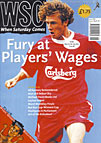 Al Needham bravely takes on Reds in the Hood by Terry Christian and If the Kids are United by Tony Hill, two reflections on Man Utd-obsessed childhoods
Al Needham bravely takes on Reds in the Hood by Terry Christian and If the Kids are United by Tony Hill, two reflections on Man Utd-obsessed childhoods
With Manchester United finally confirming their status as the team of the Nineties with probably their best season ever, it’s no surprise that large chunks of Brazil are being cut down as we speak for scores of officially endorsed ghostwritten McUnited product. Much of it will be as incisive as a plastic knife on a rhino, so perhaps we ought to play like David Mellor and let the fans have their say.
Let’s get the obvious question out of the way first – yes, that Terry Christian. The same Terry Christian who, not so long ago, spent his time interviewing people who licked old men’s dentures in The Word. Despite the horrible title (I mean, anyone who’s down with the yout’ knows that you spell it “R-E-D-Z”), it isn’t a Gunchester gangster fantasy, nor is it an account of larging it with Teddy and stopping Mad Roy from headbutting the condom machine in the Hacienda – it’s an account of growing up as a second-generation Irish lad in the shadow of Old Trafford, and what Manchester United FC means to him.
Amazingly, his prose lends itself more to Roy Hattersley than Zoe Ball (“There was nothing more disheartening than seeing five tatty cards of Jeff Astle or Jim McCalliog thrown into a game of Topsy”) and lays on the Catholic guilt trip so heavily it reminds you of Roddy Doyle – Nobby Stiles Ho Ho Ho, if you will. Having said that, it’s a pleasantly surprising meander through United’s lean period. I expected Reds in the Hood to symbolise everything that was wrong with football in the Nineties, but it turned out to symbolise everything that was good about the sport in the Seventies. What next, we wonder – Hufty’s book on Malcolm McDonald?
Oh, Tony Hill, how I wanted to hate you and your book. Born in Jacksdale, a Nottinghamshire pit village (well, it was) and coming of age just when Forest were hitting their peak in the late Seventies, he doggedly stuck to Man United, even when his dad forked out for games like the League Cup final and the European Cup game with Liverpool in a doomed attempt to steer him away from a life of incessant Umbro shirt-buying. Not even a Forest shirt from his Dad or a Derby shirt from his Grandad at Christmas can sway him. As soon as he’s old enough, he travels up to Old Trafford, eventually gets hold of a season ticket, and along the way witnesses some of the most important moments in United (and British football) history. Does this sound like something you may have read before?
Yep, we’re on familiar ground here. The Seventies were a horrible decade for fashion, George Best was great, jumpers for goalposts (the hopefully ironic title of an early chapter), football hooliganism was morbidly amusing, standing at matches was ace but I’m glad I don’t have to nowadays, and so on. It seems that the history of the Football League circa 1968-89 has been as heavily documented in print as the Second World War, but to call If the Kids are United a poor man’s Fever Pitch would be a gross injustice.
Hill is a working-class kid who got into football not in an attempt to bond with his dad, but because he probably would have been cast out of the house if he hadn’t. While Nick Hornby grew up in a football wasteland, Hill’s town is steeped in tradition – rumour has it that DH Lawrence got his lights punched out in a Jacksdale pub for not supporting a local team. While Hornby agonised over taking girlfriends to Arsenal matches, Hill was dossing down in train stations with his mates, slipping stewards fivers and just getting on with it.
Consequently, If the Kids are United avoids the soul-searching and the gloating, and if you’re looking for an alternative take on United since the Seventies, it’s worth a read. Sadly, it fails to explain to the rest of us what it’s like to be one of the icons of the football in the Nineties – a glory-hunting Judas, to use the parlance of the playground.
In the opening chapter, Hill says: “I’m not going to make any apologies for living in Nottinghamshire and supporting Man United.” Which is a shame, because if he had done so, or even tried to explain what it’s like to support a team that’s not supposed to be “yours”, it would have made for a much better book.
If the Kids are United could have been one of the best football books of the decade if Hill had told us how he felt in 1993 when he walked into his local after United won the league to find it full of other people in United shirts. While hardly “Part Kes, part Boys from the Blackstuff” as the blurb on the jacket would have it, the book is a decent read but you are inevitably reminded of Andy Cole – it scores regularly, but its reputation is let down by the open goals it misses.
From WSC 148 June 1999. What was happening this month